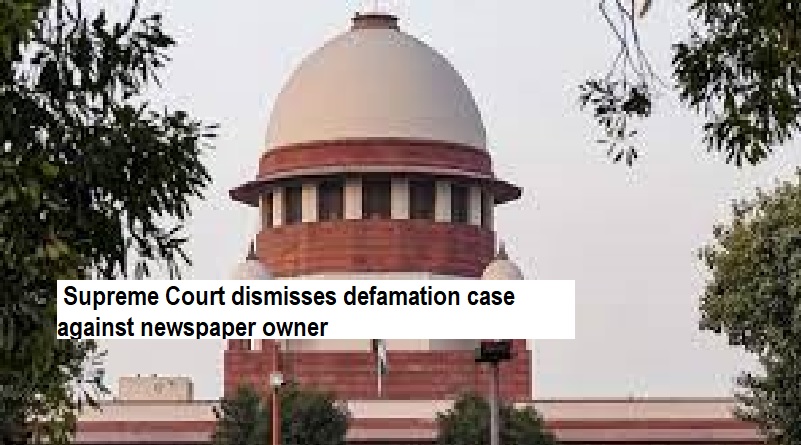


The Supreme Court has recently dismissed a criminal defamation case against the owner of a newspaper regarding an article targeting an advocate. The legal battle stemmed from a report titled "Advocate ne pan masala vyavasayi par karaya jhuta mamla darj" (Advocate files false case against Pan Masala trader), published in 2013 by the daily newspaper 'Sunday Blast' based in Madhya Pradesh.
Initially, the complaint was rejected by a Judicial Magistrate, asserting the fundamental right to freedom of speech and expression under Article 19(1)(a) of the Constitution. However, the Sessions Court later revived the case, a decision that was upheld by the Madhya Pradesh High Court. Subsequently, the accused sought relief from the Supreme Court.
In its assessment, the Supreme Court aligned with the Magistrate's perspective, affirming that the news article had been published in good faith and in the exercise of the fundamental right to freedom of speech and expression enshrined in Article 19(1)(a) of the Indian Constitution. The bench, comprised of Justices BR Gavai and Sandeep Mehta, opined that the Magistrate's decision was neither illegal nor unjustified, precluding any justification for intervention by the Sessions Court or the High Court.
The Supreme Court emphasized that the proceedings initiated against the accused appellant under Section 500 of the Indian Penal Code, 1860, based on the complaint filed by the respondent-complainant, were unwarranted. As a result, all such proceedings were quashed.
The legal saga began with the publication of the contentious article in 'Sunday Blast,' implicating the advocate in a false case against a Pan Masala trader. Despite the Judicial Magistrate's initial dismissal of the complaint, the case was resurrected by the Sessions Court and further upheld by the Madhya Pradesh High Court.
The pivotal point of contention revolved around the interpretation of Article 19(1)(a) of the Constitution, guaranteeing the right to freedom of speech and expression. The Supreme Court echoed the Magistrate's reasoning, emphasizing that the impugned news article had been disseminated in good faith and within the boundaries of the constitutional right in question.
The bench led by Justices BR Gavai and Sandeep Mehta concurred that the Magistrate's decision was reasonable and warranted no interference from higher courts. Consequently, the Supreme Court nullified all proceedings initiated against the accused appellant under Section 500 of the Indian Penal Code, deeming them incompatible with the principles of free speech and expression.
This legal outcome underscores the significance of safeguarding freedom of the press and the right to express opinions without fear of unwarranted legal repercussions. The Supreme Court's decision serves as a reaffirmation of these fundamental rights, providing a legal precedent for cases where defamation claims may infringe upon the constitutionally protected realm of free speech.
TAGS: Supreme Court Criminal defamation Newspaper owner Advocate 'Sunday Blast' Madhya Pradesh